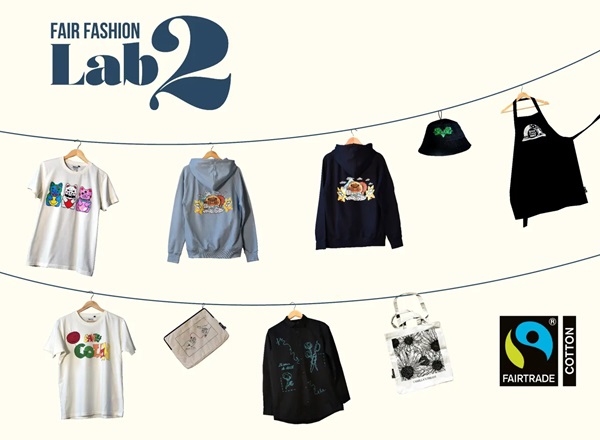 Credit: Fairtrade Lëtzebuerg
Credit: Fairtrade Lëtzebuerg
The non-profit organisation Fairtrade Lëtzebuerg recently launched its second Fair Fashion Lab collection, a project involving Luxembourg artists and Fairtrade-certified cotton clothing.
Six new local talents took part in this project, and designed exclusive “Fair Fashion” pieces now available in Luxembourg stores under the theme “Fairtrade Good Vibes Only”. This project was carried out as part of the “Rethink You Clothes” campaign, a campaign implemented by the non-profit organisations Fairtrade Lëtzebuerg and Caritas Luxembourg, on a mandate from Luxembourg’s directorate for development cooperation and humanitarian affairs (Direction de la coopération au développement et de l'action humanitaire).
Lisa Gardin, Melissa Di Bernardo, Simone Lazzaretti, Soraia Da Silva Ferreira, Tiffanie Ferrandini and Damien Giudice created individual designs in very different styles; from playful and colourful to minimalist and black and white.
The cotton used for the products is produced respecting Fairtade standards in factories located in eight countries across the world. Speaking to Chronicle.lu, Coralie Jegousse, project manager on the "Rethink Your Clothes" campaign for Fairtrade Lëtzebuerg, said: “India is the largest producer of Fairtrade cotton. Cotton is produced according to the three pillars of fair trade, in compliance with demanding social, economic and environmental standards. The cotton is then transformed into fabric, then into clothing and accessories in certified factories, the vast majority of which are also located in India.”
Asport, Action Wear, Francis and the Kräizbierg workshops print the designs in their Luxembourg workshops on the products, which are all “Fairtrade Cotton” certified. Distribution across Luxembourg is then ensured by resellers such as Asport, Akabo, the Kräizbierg foundation, the INSiDE Meliá hotel and Damien Giudice.
Discussing the differences in production between Fairtrade cotton used by the non-profit organisation compared to conventional cotton, Coralie Jegousse emphasised that the difference is not visible to the naked eye, but that in reality, they have “nothing in common”.
“The vast majority of conventional cotton is GMO (Genetically Modified Organism), so to grow it requires a massive use of pesticides that are dangerous for the health of producers and extremely harmful to the environment.” Fairtrade environmental standards demand a regulated use of pesticides and require cotton producers to limit or stop their use to protect the environment and their workers. Besides, Fairtrade producers receive a “guaranteed minimum price, a real safety net if the price of cotton falls below a critical threshold”. She added that cotton cooperatives receive a “Fairtrade Premium” which allows them to carry out projects to improve their infrastructure or social projects.
With this collection, Fairtrade Lëtzebuerg wanted to break with the “preconceived” notion that Fair Fashion is expensive. A collective movement made this project possible, due to the work of twelve passionate and committed Luxembourgish actors. “These actors offer their items at a fair price which allows people in India who worked on the production of Fair Fashion Lab 2 products to live with dignity with their families and allow their children to have access to education,” Coralie Jegousse concluded.
For example, Asport sells the T-shirt with the cat motif for €29.99, Hôtel INNSiDE by Meliá has the apron available for €35 and Damien Giudice’s tote bag is €20.








